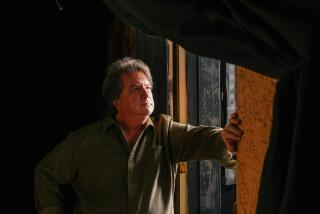Pipe Organ Is Too Big for Theater, Panel Says : Renovation: The committee also reports that the huge instrument could delay plans for converting the Alex Theatre to an arts center.
The rare Fox Lanterman pipe organ, which Glendale bought in January as the centerpiece for an ambitious plan to renovate the Alex Theatre, may be too big for the theater.
After nine months of study, the city-appointed Committee for Arts at the Alex concluded in a report released last week that the organ not only may be too large for the theater, but that the time and cost needed to restore the instrument would set back plans to convert the theater into a performing and cultural arts center.
The 21-member committee recommended the city buy the 66-year-old landmark movie house at 216 N. Brand Blvd. from Mann Theatres and renovate it without installing the organ. The renovation could be completed within 18 months after acquisition and cost about $5 million, said the report, which was released Friday.
If the city decides to install the Wurlitzer organ in the theater, the project could be delayed eight more months and cost an additional $1.6 million, according to the report.
Councilman Larry Zarian, who spearheaded the cityâs purchase of the organ for $50,000 in January from La Canada Flintridge, said he was not surprised by the recommendation. âThe important thing is to get the Alex done fast and back into operation,â Zarian said.
He said the organ could still be installed in the theater later, although city advisers have warned that its installation in a theater already renovated would be even more costly.
La Canada Flintridge officials last fall decided to sell the historic organ in the wake of complaints from neighbors that it was too loud to be played in the recital hall built for it on the Lanterman estate there. With nowhere else to house the organ, they agreed to sell it to Glendale.
Buying the organ served as the impetus for the latest round of talks about what to do with the Alex, which closed Sept. 26. The committee was appointed in January to resolve the issue.
Meanwhile, the Glendale Redevelopment Agency, which is composed of the five-member City Council, is expected to conduct a study session Nov. 19 on recommendations about the Alex by the committee, led by attorney Laurence R. Clarke.
Among other committee recommendations:
* Appoint a nonprofit corporation to oversee the theaterâs operation and fund raising.
* Restore the theater to its original 1925 facade, along with its original name--Alexander--but retain the famous spire, box office and marquee, which were added in 1940.
* Reduce the number of seats from 1,950 to 1,520.
* Develop compatible uses on the rest of the block, including a theater restaurant and bar, a multiple-screen movie complex and art galleries.
John Hedlund, chairman of a fund-raising subcommittee, urged the city to begin the project as soon as possible. But Mayor Ginger Bremberg said another study session is needed so members can âsit back, reread and digestâ the report.
Other uses for the organ may be considered, such as installing it at the Glendale Civic Auditorium or building an outdoor amphitheater, according to city reports and advisers. But those considerations are premature, city officials said this week.
A team of volunteers--mostly organ specialists, led by William Shutz of Glendale--last spring dismantled the instrument and moved it to a school warehouse in Glendale. Shutz indicated that restoration would cost at least $500,000, even with volunteer labor, and would require three years.
One organ specialist, Glenn D. White of Seattle, remembered that the organ, the largest and finest of its kind, had the power to ârattle the raftersâ when he heard it played in 1955 in the giant Fox Theater in San Francisco. He endorsed the idea of an outdoor location.
More to Read
The biggest entertainment stories
Get our big stories about Hollywood, film, television, music, arts, culture and more right in your inbox as soon as they publish.
You may occasionally receive promotional content from the Los Angeles Times.










